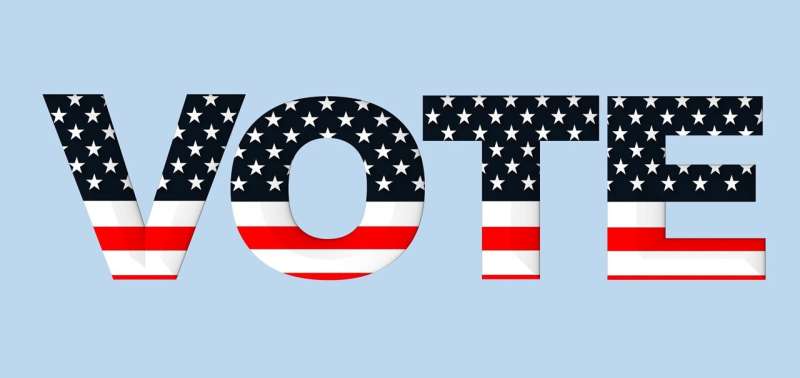This article has been reviewed according to Science X's editorial process and policies. Editors have highlighted the following attributes while ensuring the content's credibility:
fact-checked
peer-reviewed publication
trusted source
proofread
Personal crises reduce voter turnout, but may prompt other political action

Experiencing multiple life disruptions such as unemployment, eviction or a loss of health insurance makes people less likely to vote—but may motivate them to engage politically in other ways, a Cornell political scientist and co-authors report in new research.
Analyzing several large surveys of verified American voters before and during the pandemic, the researchers found that outside of highly politicized crises like COVID-19, which can increase turnout, people with unstable lives are systematically underrepresented at the ballot box.
The data showed that people experiencing the most personal crises are nearly 20 percentage points less likely to vote compared to those who experience none—a turnout gap nearly as significant as that between white and Hispanic voters. But the same challenges could prompt political participation seen as more immediately helpful, such as contacting elected officials or attending community meetings or protests.
"When people connect their problems to direct forms of political action that might address their problems, crises can actually boost political participation," said Jamila Michener, associate professor of government and policy in the College of Arts and Sciences and senior associate dean of public engagement in the Cornell Jeb. E. Brooks School of Public Policy.
"Crises are not an inevitable path towards deeper political alienation for people who are marginalized."
Michener is a co-author of "The Politics of Personal Crisis: How Life Disruptions Shape Political Participation," published April 27 in Political Behavior, with Jake Haselswerdt, associate professor of government and public affairs at the University of Missouri; and Christopher Ojeda, assistant professor of political science at the University of California, Merced.
The title references a rallying cry that emerged during women's movements in the 1960s and 70s: "The personal is political." The authors argue that personal life can be profoundly political, and that many crises are the products of a changing economy and growing inequality that have heightened risks for those with fewer resources.
Studies have examined how some individual disruptions affect political participation—foreclosure, say, or being arrested. But after successive crises in the U.S. housing, labor and health care markets, the scholars said, their study provides a more comprehensive view.
"If we only think about the political implications of one crisis at a time, we're going to understate the relationship between our larger economic environment and democracy—the political choices that people make or don't make," Michener said. "Only by considering these things together can we understand the full picture of what many people are experiencing, which is multiple crises over a period of time."
The authors analyzed publicly available data from the Cooperative Election Study (CES) in 2018 and 2020, which included common sections with more than 60,000 respondents, plus additional questions the researchers posed to nationally representative samples of 1,000. They also examined relevant data from the Democracy Fund's Views of the Electorate Research (VOTER) Survey.
The surveys validated turnout in those years with public records and included self-reports about other activity, such as attending a political meeting; putting up a political sign; working for a candidate or campaign; attending a protest; contacting a public official; and donating money. Collectively, the surveys asked if any of several dozen crises had occurred in the previous year, ranging from divorce and trouble paying medical bills to lost jobs, homes or health insurance.
As expected, after controlling for income, race and other demographic factors, the analysis showed that more crises reduced the likelihood of someone voting. A suspended or revoked driver's license was the disruption most strongly associated with lower turnout, followed by having possessions repossessed, being evicted or losing a home.
"These findings are consistent with the idea that the totality of disruptions to everyday life can be disruptive to turnout," the authors wrote.
That wasn't true for COVID-related crises, where cumulative problems were associated with increased turnout. People respond differently to highly politicized issues, the researchers suggest, about which they are saturated with news and messages drawing clear political lines.
While crises could prompt activism in place of voting, the surveys found that type of participation much less common. For example, non-voting activity reported in the 2020 CES ranged from 3% of respondents working for a candidate or campaign to 23% donating money, while voter turnout was 62%.
Overall, Michener said, the study highlights the importance of considering life disruptions in the study of political behavior, and gives elected officials and advocacy groups a more comprehensive and nuanced understanding about when people will engage politically, and what kinds of political action they're more likely to pursue.
"Choices about how to provide resources to constituents or not affect whether they engage the political process," said Michener, who also directs the Cornell Center for Racial Justice and Equitable Futures. "It clarifies the stakes of larger decisions about how to structure the economy and meet people's needs in challenging times. That very much matters for the nature and the content of our democracy."
More information: Christopher Ojeda et al, The Politics of Personal Crisis: How Life Disruptions Shape Political Participation, Political Behavior (2024). DOI: 10.1007/s11109-024-09933-x
Journal information: Political Behavior
Provided by Cornell University




















